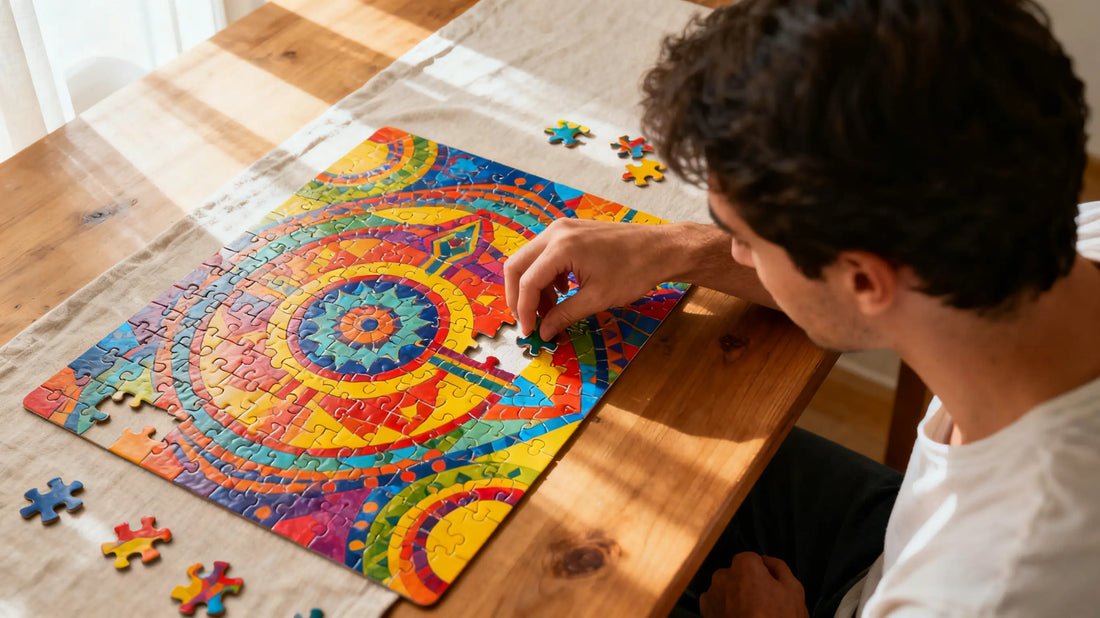
Are Jigsaw Puzzles Good for Your Brain? Science-Backed Benefits Explained
Share
Jigsaw puzzles have long been a favorite pastime for people of all ages. But beyond the fun and satisfaction of fitting the pieces together, many wonder: Are jigsaw puzzles actually good for your brain? The short answer is yes. Backed by scientific studies, puzzles not only entertain but also sharpen the mind, reduce stress, and even promote social connection.
In this article, we’ll dive deep into the science-backed benefits of puzzles, explore how they affect different areas of brain function, and share why adding puzzles to your daily routine can be a simple but powerful way to boost mental health.
Table of Contents
1.Boosts Memory and Cognitive Skills
2.Improves Focus and Problem-Solving
3.Encourages Stress Relief and Mindfulness
4.Promotes Social Interaction and Bonding
5.Supports Brain Health as You Age
6.Creative Ways to Use Puzzles in Daily Life
7.Final Thoughts
8.FAQ
1. Boosts Memory and Cognitive Skills
Jigsaw puzzles engage both the left and right hemispheres of the brain. The left side focuses on logic and sequence, while the right side manages creativity and visualization. This dual activation strengthens short-term memory, recall, and recognition.
For example, when you remember the color, shape, and placement of pieces, you’re exercising the same memory functions you use in daily problem-solving tasks. Studies suggest that puzzle-solving activities may reduce the risk of cognitive decline later in life.
👉 Curious about the creation process? Check out our guide on How Are Puzzles Made to see the fascinating steps behind your favorite brain games.
2. Improves Focus and Problem-Solving
Working on puzzles requires sustained attention and strategic thinking. As you try different combinations, you strengthen your ability to test hypotheses and adapt strategies—skills that translate well into real-world problem-solving.
Whether it’s in professional tasks or personal challenges, this kind of critical thinking builds resilience and adaptability.
3. Encourages Stress Relief and Mindfulness
Puzzles act as a form of active meditation. The repetitive act of scanning, sorting, and fitting pieces brings your mind into a state of calm. This lowers heart rate, reduces cortisol levels, and helps you feel more grounded.
Harvard Health notes that mindfulness activities like puzzles can improve overall mental well-being and reduce anxiety [source].
4. Promotes Social Interaction and Bonding
Puzzles are not just a solo activity—they encourage teamwork, communication, and bonding. Families often use puzzles as a way to spend quality time together without screens.
If you’ve ever completed a large puzzle with friends or family, you know the shared sense of accomplishment that comes with placing the final piece.
5. Supports Brain Health as You Age
Engaging in puzzles regularly may delay cognitive decline and keep the brain sharp. Activities that challenge the mind, like jigsaw puzzles, have been linked to a reduced risk of dementia and Alzheimer’s disease.
This makes puzzles an excellent hobby for seniors looking to maintain mental agility while enjoying a relaxing activity.
6. Creative Ways to Use Puzzles in Daily Life
Once you finish a puzzle, don’t just take it apart—there are plenty of creative ways to extend its value. You can frame it as wall art, repurpose it into DIY crafts, or even donate it to charity.
👉 For more inspiration, explore our article on What to Do with Finished Puzzles for 10 creative ideas that go beyond the ordinary.
7. Final Thoughts
So, are jigsaw puzzles good for your brain? Absolutely. From enhancing memory and sharpening focus to providing stress relief and supporting long-term brain health, puzzles are more than just a pastime—they’re a mental workout with lasting benefits.
Whether you work on them alone for mindfulness or with loved ones for bonding, puzzles are a simple yet powerful way to nurture both mind and soul.
FAQ
Q1: How often should I do puzzles to see benefits?
Even 15–30 minutes a day can improve focus and relaxation. Consistency is more important than duration.
Q2: Are puzzles better for kids or adults?
Both! Kids gain developmental and problem-solving skills, while adults enjoy stress relief and brain training.
Q3: Can puzzles really prevent memory loss?
While puzzles can’t guarantee prevention, they strengthen cognitive reserve, which may help delay age-related decline.
Q4: Are digital puzzles as effective as physical ones?
Yes, though physical puzzles may provide additional tactile and screen-free benefits.
